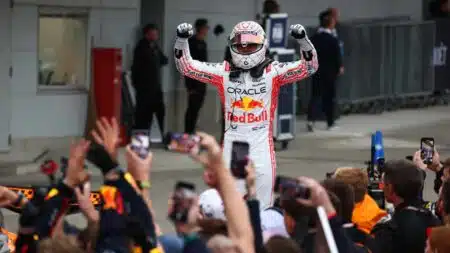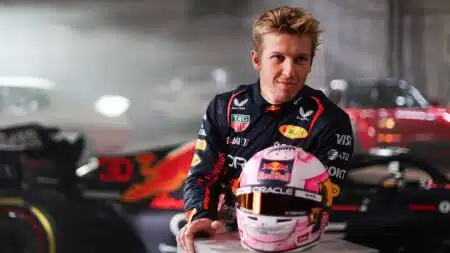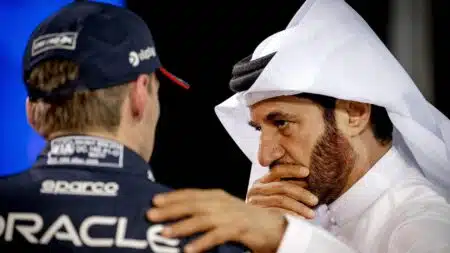
F1 snore-fest shows new cars badly needed: Up/Down Japanese GP
The 2025 Japanese GP showed a much more extreme change than next year's technical regulations is needed to make racing at classic F1 tracks interesting
As I sit here to write my final United SportsCar column of 2015 I’m struggling a little to stay fully awake and focused. Hopefully this isn’t because of the soporific nature of my ramblings, but more to do with the fact that I haven’t had much time back in the UK to fully recover from ‘Road Atlanta time’!
Another thing that I haven’t yet had enough time to do is to dry out all of my racing gear. My race boots in particular are still sat on a radiator recovering from the monsoon conditions that we experienced at Petit Le Mans. They left me walking up onto the podium at the end of the race feeling like I was wearing Wellington boots that someone had poured a couple of pints into…
I had been fortunate to bump into friend and touring car legend Andy Priaulx while checking in for our flight to Atlanta, which meant I had some great company to while away the eight-hour flight. The weather that greeted us, though, was pretty horrific, quite unusual for Atlanta in October. After a bit of investigating and looking at various satellite pictures it turned out that indeed the next few days were, if anything, going to get worse as the area was being subjected to the remnants of Hurricane Joaquin and flash flood alerts were at their highest level for years.
Practice
When myself and my BAR1 Motorsport team-mates got out on track, we readied ourselves for what everyone in the whole pitlane knew was coming: a very wet race indeed.
Normally, if it rains heavily at Road Atlanta, you don’t venture out of the pits much unless it’s absolutely necessary as the undulating nature of the circuit lends itself to quickly forming fast rivers of water that flow across the track in all sorts of tricky places making aquaplaning very likely. We all know what happens when you mix carbon fibre and concrete… But in this particular instance, knowing what was coming for the race, we chose to get as much running in as possible.
The team was running four drivers at the race, which wasn’t ideal in terms of giving everyone good track time, so I stood down and allowed my team-mates to get as much time as possible. In terms of wet driving I went into qualifying with only 15 minutes under my belt in our Oreca Prototype Challenge car.
Qualifying
I must admit that it was with some trepidation that I set out at the start of the qualifying session! It actually started raining quite heavily just before our session, but then eased off to a slight drizzle, so I knew that every lap would probably be quicker than the previous one, and that pole position would almost certainly go to whichever driver was the last to take the chequered flag at the end.
Early on in the qualifying session I realised that I’d committed a bit of a rookie mistake: it’s been so long since I’ve driven in the wet in an open-cockpit race car that I’d forgotten that tear-offs and rain don’t mix, as the water gets between the tear-off and the visor and basically makes you feel like you’re sat behind a juggernaut on the M25 in the pouring rain with no wipers! Initially I thought nothing of it and just went to tear it off, but for some reason it decided to fly back onto my visor and stick to it like glue right across the middle of my helmet. The only way I could get rid of it was to slow right down on the back straight, take my right glove off, peel the tear-0ff away with my thumbnail, put my glove back on and continue, all of which took a bit of time.
I continued on my merry way, mentally not really in full qualifying mode, as the track conditions were still bad enough that there was standing water in several corners and the last thing I wanted was to throw the car off and compromise our race, given that starting from pole has little bearing on the outcome of a long endurance race (as we proved at Daytona). It wasn’t until I was about two thirds into our 15-minute session that I wondered what position we were in, and can honestly say I was shocked when the team came back and told me we were currently on pole position. As I suspected, however, the positions were changing lap by lap, so, asking the team to keep me informed, I got my head down and started trying to carry a bit more speed into the faster corners. Basically I tried to be a bit braver in Turns 1 and 12, both of which are monster fast corners in a prototype in the dry, a little less so in the wet.
I managed to get two good laps in, taking pole with each effort, but then unfortunately, due to my earlier antics in getting rid of my tear-off, I was the unfortunate schmuck who got given the chequered flag first, the team later telling me that it was only a matter of another four seconds and I would have got an extra lap! Although I bettered my laptime as I took the flag to take pole position, I knew I was unlikely to keep it, and sure enough Tom Kimber-Smith did a fine job to nick it off me about a minute later. I was a little disappointed because I felt I’d left quite a bit of laptime on the table, having gone out in the session with a survival mindset, but at the same time, because of that, I didn’t really feel I’d deserved pole. Especially because the delay on track that probably cost me pole had been of my own making. In fact, given I took the chequered first I was actually pleased to qualify second, although like all of these things, you get greedy afterwards and start wondering what could have been as it would have been nice to add to my pole tally this year. The car felt pretty good in the wet, though, and I was confident we could have a strong race.
The race
As expected, the day of the race dawned with torrential rain, the worst that we had witnessed so far. In my previous 15 Petit Le Mans I have never seen so many umbrellas on the grid, and for rain rather than to block out the sun! One positive was that we were starting 6th overall, which meant that the visibility in the spray when following other cars hopefully wouldn’t be too bad. It was still very tricky when, after two pace laps, we finally went green. I managed to get around Tom Kimber-Smith to lead our class and run fifth overall as we exited Turn 1, but it was to be short-lived as exiting Turn 3 I half spun allowing three cars to come back past me. I was fortunate at this point that I wasn’t hit by any of the following pack, and Tom in particular has my gratitude as he was very skilful in the way he avoided t-boning me!
I soon made my way back up to the front and hounded Tom in the lead PC car, and then managed to overtake him just after our first round of pitstops and lead right up to almost the third hour of the race. By this time already I was becoming increasingly aware that this race was not going to be about laptime, but pure survival as the conditions were among the worst I have ever endured for a prolonged period in a race car. The rain never stopped completely. Instead it would just vary in intensity and the prototypes (and our class in particular) would really start to struggle as soon as the standing water built up on the circuit. You could see that from the amount of cars that just aquaplaned straight off the circuit, some of them even in a straight line, and as we cycled through all the other drivers it was almost inevitable that every half an hour or so another car would crash bringing out yet another yellow flag.
Eventually the race director sensibly decided to red flag the race while there was still some daylight left. That way there was some light to try and sort drainage ditches, but given the waterlogged nature of the ground it was a pretty joyless task. Ironically the conditions when the red flag was thrown were among the best we’d had for a while and almost on cue, as we went back to green flag racing, it started to pour down heavier than ever before. I was placed in the car at that point and officially there were still over three hours left to go in the race.
After about an hour of splashing around, getting very wet and very cold with no roof over my head (and getting even colder and wetter when we were lapping slowly behind the pace car as the water would just stream into the cockpit) we arrived at the point where, for the first time in over 20 years of racing the thought did enter my head about whether I should just come into the pits and declare to the conditions too dangerous to continue.
To be honest I never seriously considered acting on that thought, as I probably lack the courage to take a decision like that, such as Niki Lauda did all those years ago in Fuji. The fact that the thought even entered my head hopefully goes some way towards showing how bad the conditions were. I think when drivers start aquaplaning off in the middle of the straight, such as Bruno Junqueira did, then it’s time to stop the race. When the chequered flag was thrown, approximately two hours earlier than planned, I have to admit I was relieved, even if it did cost me any chance of fighting back up the order from the third place we had dropped down to. I don’t think I was alone in feeling that relief. Even drivers like current IndyCar champion Scott Dixon told me afterwards that they were also calling for the race to be stopped.
Up until that point it had become abundantly clear that the worse the conditions were the better it was for the GT cars, and the Porsche in particular with their slightly more rearward weight distribution. That takes absolutely nothing away from a fine drive from my old ELMS sparring partner Nick Tandy and his team-mate Patrick Pilet, who both did a superb job to win the race overall in a GT car, the likes of which I hadn’t seen since we finished second at the Daytona 24 hours in 2003. We still didn’t win a watch because the top three were all GT cars! That was in the very early days of the Daytona Prototype’s existence, though, and Porsche’s overall win in 2015 at Petit Le Mans will, I think, go down as one of the greatest ever David over Goliath victories. Huge kudos to them.
As far as BAR1 Motorsport and the rest of us are concerned, it was still a fine race result and neatly bookends a pretty good season with another podium and gives us all some momentum to carry forward into 2016.
Before you know it we’ll be flying out to Daytona again for the Roar before the 24!’
Until the next time stay safe everyone. All the best.

The 2025 Japanese GP showed a much more extreme change than next year's technical regulations is needed to make racing at classic F1 tracks interesting

Max Verstappen looks set to be pitched into a hectic, high-stakes battle for F1 victories in 2025, between at least four teams. How will fans react if he resorts to his trademark strongman tactics?

Red Bull has a new team-mate for Max Verstappen in 2025 – punchy F1 firebrand Liam Lawson could finally be the raw racer it needs in the second seat

The 2024 F1 season was one of the wildest every seen, for on-track action and behind-the-scenes intrigue – James Elson predicts how 2025 could go even further